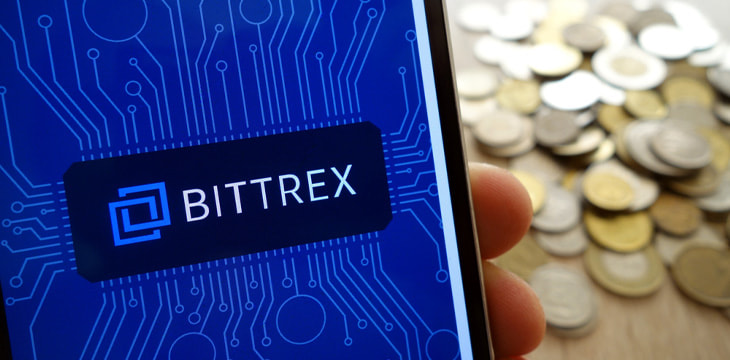|
Getting your Trinity Audio player ready...
|
Seattle-based digital asset exchange Bittrex Inc. will be winding down its operations in the United States from April 30, citing regulatory uncertainty in the country.
The exchange announced via Twitter that it would be closing its U.S. operation by end of April 2023 due to “continued regulatory uncertainty.” The platform will suspend all trading on April 14, but customers have until April 30 to withdraw their funds.
Due to continued regulatory uncertainty, we have made the difficult decision to wind down our U.S. operations, effective April 30, 2023. All funds are safe and can be fully withdrawn immediately.
This does not affect customers of @BittrexGlobal https://t.co/MY4u7XLk9z
— Bittrex (@BittrexExchange) March 31, 2023
In a further update on its website, titled “Important Information for Bittrex U.S. Customers,” the exchange clarified that, “it’s just not viable for us to continue to operate in the current U.S. regulatory and economic environment.”
The platform was keen to point out that this will not affect customers of Bittrex Global, which is a separate entity registered in Bermuda and serving customers from around the world—except for the U.S. and those under sanctions or prohibitions.
Richie Lai, who co-founded the exchange along with Bill Shihara and Rami Kawach in 2014, took to Twitter on Friday to explain the decision, as well as lament its necessity:
“When three guys built Bittrex, it was about technology,” said Lai. “Nine years later, the crypto ecosystem is very different. Regulatory requirements are often unclear and enforced without appropriate discussion or input, resulting in an uneven competitive landscape. In the end, we made great strides towards accomplishing our goal of maturing the crypto space. However, operating in the US is no longer feasible and Bill, Rami and I will focus on helping Bittrex Global succeed outside the US.”
The regulatory environment of which Lai speaks is one of increased scrutiny, after a tough year for the industry, and Bittrex has been no stranger to run-ins with the U.S. authorities since its inception.
The bumpy road to shutting up shop
The first of several major blows to the cryptocurrency exchange came in 2019, when the New York Department of Financial Services (NYDFS) turned down Bittrex’s application for a BitLicense, the state’s virtual currency license. A BitLicense is mandatory to operate virtual currency services in the state of New York, and the decision meant the platform was unable to serve customers within the state.
Explaining the decision, the NYDFS said there were a number of failings at the exchange which were cause for concern. In particular, the regulator noted issues with anti-money laundering processes, and a “failure to demonstrate that it will conduct its business honestly, fairly, equitably, carefully, and efficiently.”
A possible reason for the NYDFS to come to this conclusion was accusations that Bittrex had been allowing North Koreans to make accounts on its platform, something which would break U.S. and international sanctions. However, the exchange vehemently denied this, putting out a statement on the April 22, 2019, saying, “there are no users from North Korea trading on our platform” and that in fact “South Korean users mistakenly selected North Korea in our country dropdown menu.”
This was never proved either way and in the end no charges were brought against the exchange, but the incident likely hurt the company’s image in the eyes of regulators, which could have contributed to it being denied a BitLicense.
Unfortunately for Bittrex, this wasn’t the end of its quarrel with financial regulators over sanctions breaking.
In October 2022, the U.S. Treasury Department’s Office of Foreign Assets Control (OFAC) and Financial Crimes Enforcement Network (FinCEN) fined Bittrex $24 million and $29 million respectively. OFAC alleged “deficiencies related to Bittrex’s sanctions compliance procedures,” accusing the platform of not preventing people located in the sanctioned jurisdictions of Ukraine’s Crimea region, Cuba, Iran, Sudan, and Syria from using its platform between March 2014 and December 2017. The company settled the case for $24.3 million.
Simultaneously, FinCEN imposed a $29.3 million penalty on Bittrex for “willful violations” of the anti-money laundering (AML) and suspicious activity report (SAR) requirements of the U.S. Bank Secrecy Act (BSA). BSA obligations require money services businesses (MSB) to develop, implement and maintain an effective AML program. FinCEN suggested that rather than deploying “widely available transaction monitoring software tools,” Bittrex relied on just two “minimally” trained employees to monitor upwards of 23,800 transactions per day.
Accusations of improper conduct and fines totaling more than $53 million compounded a bad few years for the exchange in the U.S., which saw its market share fall from 22.75% in January 2018 to less than 1%, as of April this year—according to data from The Block.
Add to this a rocky 2022/2023 for the industry as a whole, with the TerraUSD/Luna scandal in May, the FTX crisis in November, and more recently the collapse of several tech-banks, including Silicon Valley Bank and Silvergate.
In the wake of these events, regulators have been increasingly active, cracking down on misconduct by digital asset exchanges. Last month alone saw the U.S. Securities and Exchange Commission (SEC) step in to oppose Binance’s purchase of Voyagers assets, as well as informing Coinbase to expect imminent legal action for violating federal securities laws; and in a civil suit the Commodity Futures Trading Commission (CFTC) accused Binance of a “calculated, phased approach” to violate U.S. commodities regulations.
This “regulatory uncertainty,” combined with its recent heavy fines and dwindling market share, have all led to Bittrex’s—perhaps unsurprising—decision to withdraw from the country.
Watch: Law & Order – Regulatory Compliance for Blockchain & Digital Assets

 02-15-2026
02-15-2026 




